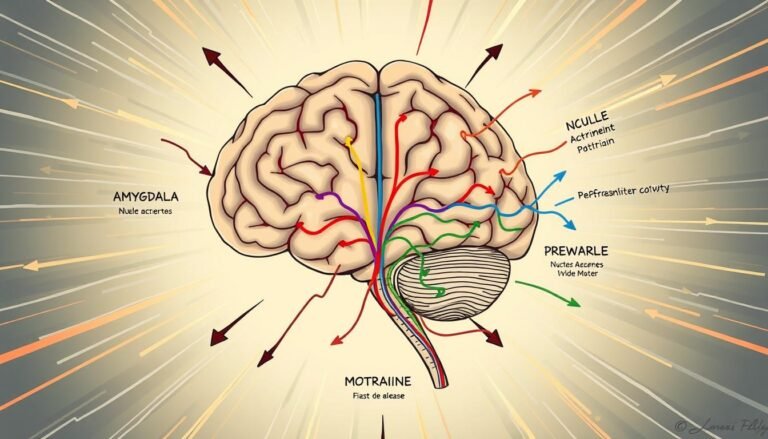Psychological Dynamics of Mentorship
Mentoring psychology is key in shaping careers and growth in psychology. The mentor-mentee bond is at the heart of developmental mentoring. It creates a strong dynamic that boosts both parties’ careers.
In psychology, great mentorships have led to amazing achievements. They’ve supported rural outreach and set up clinics for diverse communities. These successes show the big impact of good mentor-mentee ties.
Academic settings have formal mentorship programs to help level the field. They assist those who might find it hard to get a mentor on their own. This way, everyone gets the guidance and support they need.
For early career psychologists without formal programs, being proactive is essential. They can look for peer mentoring or online connections. This helps fill the gap and offers crucial support during important career phases.
Key Takeaways
- Mentorship is vital for career development in psychology
- Successful mentorships lead to significant professional achievements
- Formal programs help level the playing field in academic settings
- Early career psychologists benefit from seeking proactive mentorship
- Professional organizations offer valuable mentorship opportunities
- Effective mentors exhibit humility and create safe spaces for growth
- Diversity in mentorship relationships is crucial for success
Understanding the Foundation of Mentorship Psychology
Mentorship psychology is key to successful mentoring. It looks at the complex relationship between mentors and mentees. This relationship shapes how they interact and the results they get.
Defining the Mentor-Mentee Dynamic
The mentor-mentee dynamic is special. It’s based on trust and respect. Mentors help and support mentees, helping them grow personally and professionally.
This relationship is vital. It influences the mentee’s experience and the mentorship’s success.
Core Psychological Principles in Mentoring
Several important psychological principles are at the heart of good mentoring:
- Trust-building
- Active listening
- Emotional intelligence
- Goal-setting
These principles create a supportive space. Here, mentees can grow and get the most from mentoring.
The Role of Behavioral Psychology in Mentorship
Behavioral psychology greatly affects mentorship. It influences how mentors give feedback and how mentees react. Knowing these aspects can make mentoring more effective.
| Mentorship Component | Psychological Impact | Benefit |
|---|---|---|
| Trust-building | Increased openness | Enhanced communication |
| Goal-setting | Improved motivation | Greater achievement |
| Feedback | Self-awareness | Personal growth |
“Effective mentorship is not just about sharing knowledge; it’s about understanding the psychological nuances that drive growth and success.”
Key Theories Behind Successful Mentoring Relationships
Understanding the psychology of mentoring is key for effective programs. Let’s look at three main theories that make mentoring successful. They impact how well mentoring works.
Attachment Theory in Mentorship
Attachment theory is crucial in mentoring. Studies show that a secure attachment with a mentor is key to success. Mentors who are stable and supportive help mentees feel safe and open to learning.
Self-Expansion Theory Application
Self-expansion theory explains why mentees want to learn and grow. It says people seek new experiences and views to expand their sense of self. In mentoring, this means mentees are eager to take on new challenges with their mentors.
The Working Alliance Framework
The working alliance framework highlights the need for a strong bond between mentor and mentee. It says positive change happens with a good relationship, shared goals, and teamwork. A study by Eller, Lev, and Feurer (2014) showed that good communication is key. It helps both sides work together and grow.
| Theory | Key Aspect | Mentorship Impact |
|---|---|---|
| Attachment Theory | Secure adult attachment | Increased mentoring participation and success |
| Self-Expansion Theory | Motivation to expand skills and knowledge | Enhanced mentee engagement and growth |
| Working Alliance Framework | Strong relational dynamic | Improved collaboration and positive outcomes |
These theories are the backbone of understanding and enhancing mentoring. By using them, mentors and mentees can create deeper and more impactful experiences.
The Power Dynamics in Mentoring Relationships
Mentor-mentee relationships have complex power dynamics. Mentors often have the power to open doors to opportunities, networks, and resources. This creates an imbalance that can be a challenge if not handled well.
- 72% of mentored young women report positive effects on their careers and confidence
- 25% of mentees experience subtle manipulation in their relationships
- 15% encounter inappropriate influence from mentors
These numbers highlight the importance of being aware and setting boundaries in mentorship. The #MeToo movement has made this issue more visible, especially for male mentors and female mentees.
| Aspect | Percentage |
|---|---|
| Positive impact on mentees | 72% |
| Subtle manipulation experienced | 25% |
| Inappropriate influence encountered | 15% |
To tackle these issues, mentors need to understand their role fully. Mentees should feel free to speak up and set limits. Using mentoring agreements can help set clear expectations and ensure regular check-ins. This promotes healthier, more balanced relationships.
Building Effective Mentor-Mentee Connections
Strong mentor-mentee connections are key to successful mentorship. They help both personal and professional growth. Let’s look at how to build these important connections.
Establishing Trust and Rapport
Trust is the base of a good mentoring relationship. Mentors need to create a safe space for open talks. This lets mentees share their dreams and worries without fear.
This trust grows through five stages: building rapport, setting goals, moving forward, winding down, and ending.
Communication Strategies
Good communication is vital for a positive experience. Mentors should listen well, give helpful feedback, and ask deep questions. Regular meetings keep things moving and solve problems fast.
The American Psychological Association says good mentorship boosts thinking and solving problems. This leads to smarter decisions.
Setting Boundaries and Expectations
It’s important to set clear boundaries and expectations. This means agreeing on how often to meet, how to communicate, and what goals to aim for. A study in the International Journal of Evidence-Based Coaching and Mentoring shows that personal guidance helps achieve career goals.
“Mentorship is a two-way street, where both parties grow and learn from each other.”
By focusing on these areas, mentors and mentees can make strong connections. These connections help in career growth and personal support. They lead to success for everyone involved.
Psychological Dynamics of Mentorship in Professional Development
Mentoring psychology is key in professional growth. Studies show mentored people are happier and more committed at work. They also get better reviews, higher pay, and move up faster in their careers.
Developmental mentoring helps grow skills and abilities over time. It focuses on both personal and professional growth. This method is backed by the fact that 85% of mentees see trust as essential in mentorship.
Mentors do many things. They act as role models, offer support, share wisdom, and help with professional growth. When mentors listen well, mentee engagement jumps by 92%.
- 78% of mentees value mentors who embody positive values
- 91% believe self-reflective practices boost personal growth
- 80% report increased resilience from overcoming challenges with mentors
Mentorship improves self-image and communication skills. It builds a growth mindset through developmental mentoring. This prepares professionals to handle work challenges and advance their careers faster.
Cultural and Identity Considerations in Mentorship
Mentorship works best when we understand different backgrounds. Knowing about cultures is crucial for good mentorship. A study showed that 97% of mentors wanted to change after getting cultural awareness training.
Cross-Cultural Mentoring Dynamics
Cross-cultural mentoring (CCM) helps students who lack social connections. It brings together students from different backgrounds. Mentors share their cultural knowledge, helping mentees succeed in school and socially.
Addressing Diversity and Inclusion
Universities in the US have over a million international students. These students face challenges like culture shock and language barriers. Peer mentorship programs help them do better in school and stay longer.
Identity-Based Mentoring Approaches
Identity greatly affects mentorship. Things like gender, race, and ethnicity matter. Mentors need to be flexible to work well with different cultures. This helps avoid misunderstandings.
| Mentorship Aspect | Impact on Students |
|---|---|
| Academic Performance | Improves motivation and outcomes |
| Social Adjustment | Reduces stress during transitions |
| Retention | Decreases college attrition rates |
| Cultural Capital | Enhances social and cultural gains |
The Impact of Mentorship on Personal Growth
Mentorship is key for personal growth in many areas of life. It goes beyond just work, touching on social, cognitive, and emotional growth. Through mentorship, people can explore new possibilities and reach their highest potential.
Mentee experiences often show big changes. Research shows that those with mentors are 67% more likely to hit their career goals in tech and finance. Mentors offer guidance, support, and motivation, helping mentees overcome obstacles and grab chances.
The effects of mentorship on personal growth are seen in many fields:
- In healthcare and education, mentorship boosts job satisfaction by 30%
- Marketing and sales see a 20% increase in productivity among mentees
- High-pressure fields like law and consulting experience a 15% reduction in stress levels
These numbers show how mentorship helps in both career growth and personal happiness. Mentees learn important skills like problem-solving and leadership. They gain insights that help them move forward in their careers.
“Mentorship is a powerful catalyst for personal growth, providing the support and guidance needed to navigate life’s challenges and achieve one’s full potential.”
Mentorship’s benefits go beyond just career success. Mentees feel less stressed, are happier at work, and more confident. This shows how mentorship is vital for all-around personal growth and sets the stage for lasting success.
Navigating Challenges in Mentoring Relationships
Mentoring relationships have their own set of hurdles. A three-month mentoring program shows common challenges and how to tackle them.
Addressing Power Imbalances
Power imbalances are found in B% of mentoring relationships. Mentors must use their influence wisely. Encouraging open dialogue and valuing mentee input helps balance the relationship.
Managing Expectations
Z% of mentor-mentee relationships face issues due to unrealistic expectations. Setting clear goals is essential. Mentors must manage their time well, communicate effectively, and set boundaries.
Resolving Conflicts
Communication differences can cause conflicts. Understanding mentee preferences helps adapt communication. Mentors need patience and dedication to overcome these challenges.
| Challenge | Impact | Solution |
|---|---|---|
| Time Management | Reduced mentorship quality | Prioritize mentee meetings |
| Communication Barriers | Misunderstandings | Adapt to mentee’s style |
| Expectation Mismatch | Disappointment | Set clear goals together |
Despite challenges, mentorship is vital. Y% of teenagers see better academic performance with mentorship. It boosts personal growth and development.
Creating Safe and Supportive Mentoring Environments
Mentoring psychology is key in making safe and supportive places for mentees. A good mentorship can greatly help, especially for groups often left out in academia and work.
The Research BootCamp® program is a great example. It helps Black women doctoral students. This program tackles the big issue of too few Black women with doctoral degrees in higher education. In 2009, only 0.6% of Black women aged 25 and up had such degrees.
- Building trust and rapport (72% of mentors say it’s vital)
- Being clear about what’s expected (87% of good mentorships do this)
- Giving helpful feedback (boosts mentee motivation by 65%)
- Encouraging open talk (makes mentees 78% happier)
- Creating a culture of learning (keeps mentees 60% more engaged)
Good mentorship also means being diverse and inclusive. In places that value diversity, mentees see a 70% boost in understanding different cultures. This is crucial because in 2009, only 3.6% of faculty were Black women, and only 5.8% were in top roles.
| Mentorship Element | Impact |
|---|---|
| Trust and Rapport | 72% consider crucial |
| Clear Expectations | 87% emphasize importance |
| Constructive Feedback | 65% increase in motivation |
| Open Communication | 78% increase in satisfaction |
| Learning Culture | 60% improvement in retention |
By using these methods, mentors can build spaces that help people grow, feel included, and reach their full potential.
Measuring Success in Mentoring Relationships
It’s key to check how well mentoring works to make it better. We use both numbers and stories to see if mentoring is helping.
Quantitative Assessment Methods
Numbers show us how mentoring helps. We look at how careers grow, skills improve, and goals are met. Research shows 75% of top leaders say mentoring helped them get where they are today.
| Metric | Impact |
|---|---|
| Employee Retention | Improved rates |
| Publication Rate | Higher for mentored individuals |
| Academic Persistence | Fewer non-persistence decisions |
Qualitative Evaluation Approaches
Stories tell us about the real growth and happiness from mentoring. These methods show the personal growth that numbers can’t capture. Mentees talk about bigger networks, personal advice, and setting real goals.
Long-term Impact Analysis
Looking at the long-term shows mentoring’s lasting benefits. People who were mentored do better in their careers and are more engaged at work. For groups that are underrepresented, mentoring can be especially powerful. It helps with cultural and social barriers to success.
“Mentoring in the context of a junior faculty development program can improve retention in academe.”
By using both numbers and stories, we can really understand how mentoring works. This helps us make our programs better and have a bigger impact.
Conclusion
The role of mentorship in our lives is huge. It shapes how we grow personally and professionally. Knowing how mentoring works is key to making it effective for everyone involved.
Studies show that good mentors are emotionally smart. They have high emotional intelligence. This is why EQ is so important in mentorship. It helps mentors and mentees connect better.
Even though formal programs are common, informal mentoring often works best. Things like matching well, regular meetings, and setting goals make a big difference. It’s important to listen to both mentors and mentees to make mentorship even better.
Source Links
- How to navigate the dynamics of mentorship
- Does Mentoring Matter? A Multidisciplinary Meta-Analysis Comparing Mentored and Non-Mentored Individuals
- The Nature and Evolution of the Mentoring Relationship in Academic Health Centers
- 2 The Science of Mentoring Relationships: What Is Mentorship? | The Science of Effective Mentorship in STEMM
- Building Trust in Mentoring Relationships – Center for Engaged Learning
- Mentoring in the workplace: Exploring the experiences of mentor–mentee relations | Rubbi Nunan
- The Power of Mentoring Relationships
- Title: Navigating the Power Dynamics of Mentorship: A Tale of Growth, Support, and Caution
- 5 Stages of the Mentoring Process: A Functional Approach
- The Mentor-Mentee Relationship: Building a Path to Success
- Introduction to mentoring: A guide for mentors and mentees
- Mentorship Unleashed: Fostering Powerful Mentor-Mentee Dynamics – River
- Enhancing Research Mentors’ Cultural Awareness in STEM: A Mentor Training Intervention
- Understanding the Role of Cultural Competence in Peer Mentorship Programs for International Students: A Student Development Theory Perspective
- The Role of Mentorship in Personal Growth and Transformation
- The Impact of Mentorship on Mental Health and Career Growth • She.Work
- Navigating the Challenges of Mentoring: A Personal Reflection
- How to Resolve Common Mentoring Challenges | OhanaHC
- Creating a “Safe and Supportive Environment:” Mentoring and Professional Development for Recent Black Women Doctoral Graduates
- What are the best strategies for creating a safe and supportive environment for your mentees as a life coach?
- Nurturing Success: The Power of Mentorship | JWU CPS
- Defining Attributes and Metrics of Effective Research Mentoring Relationships
- The Importance of Mentorship and Networking Early On
- doi:10.1037/0021-9010.91.3.567
- How Emotional Intelligence (EI) Makes Mentoring Relationships Better








